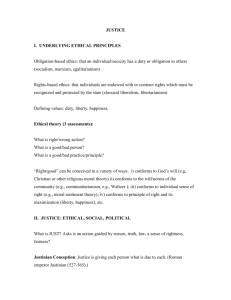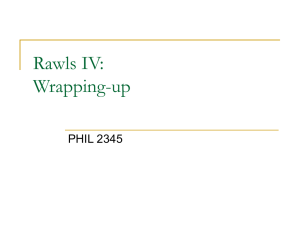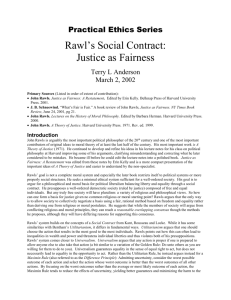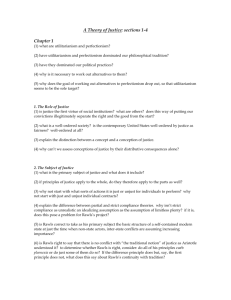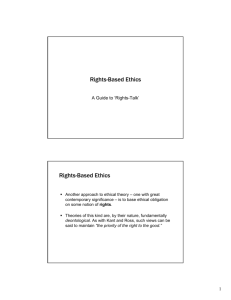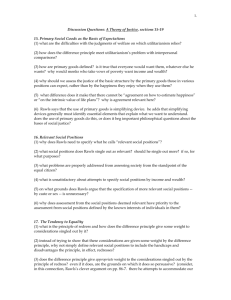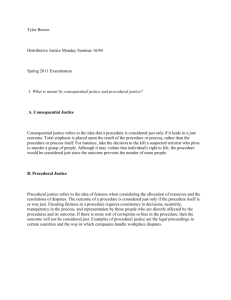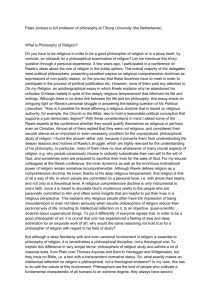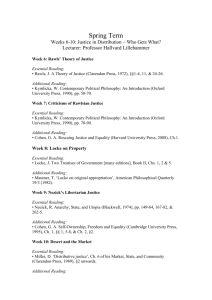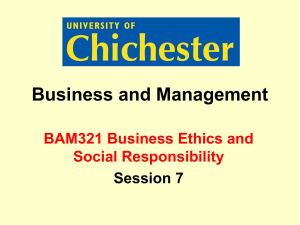Justice as Fairness: Applications
advertisement
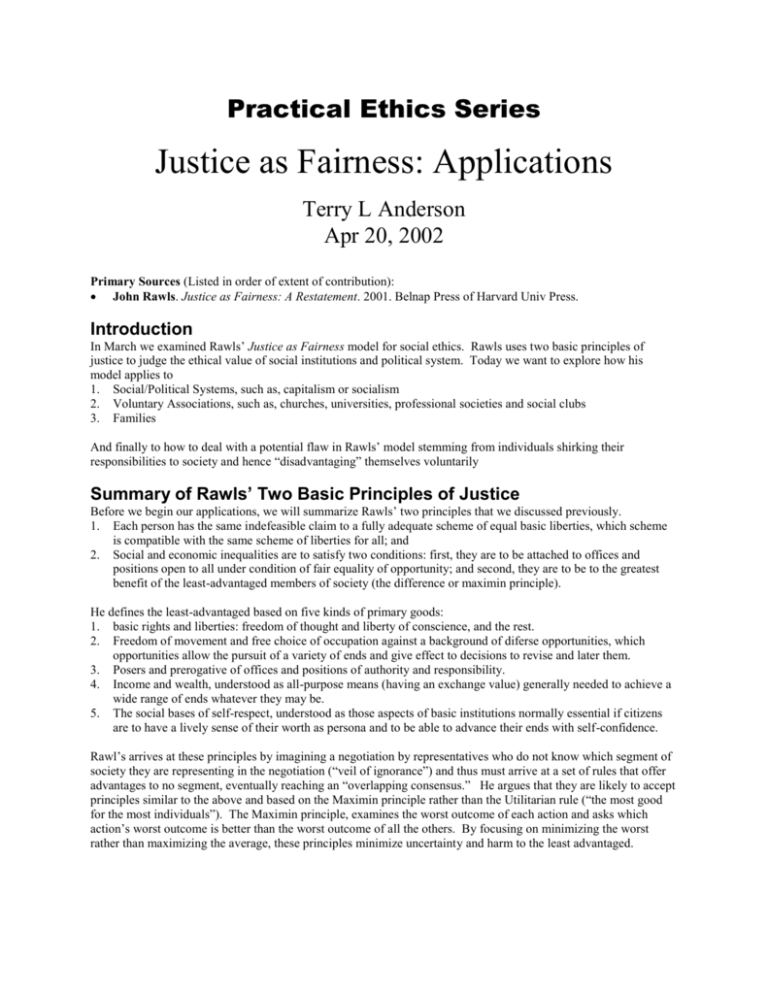
Practical Ethics Series Justice as Fairness: Applications Terry L Anderson Apr 20, 2002 Primary Sources (Listed in order of extent of contribution): John Rawls. Justice as Fairness: A Restatement. 2001. Belnap Press of Harvard Univ Press. Introduction In March we examined Rawls’ Justice as Fairness model for social ethics. Rawls uses two basic principles of justice to judge the ethical value of social institutions and political system. Today we want to explore how his model applies to 1. Social/Political Systems, such as, capitalism or socialism 2. Voluntary Associations, such as, churches, universities, professional societies and social clubs 3. Families And finally to how to deal with a potential flaw in Rawls’ model stemming from individuals shirking their responsibilities to society and hence “disadvantaging” themselves voluntarily Summary of Rawls’ Two Basic Principles of Justice Before we begin our applications, we will summarize Rawls’ two principles that we discussed previously. 1. Each person has the same indefeasible claim to a fully adequate scheme of equal basic liberties, which scheme is compatible with the same scheme of liberties for all; and 2. Social and economic inequalities are to satisfy two conditions: first, they are to be attached to offices and positions open to all under condition of fair equality of opportunity; and second, they are to be to the greatest benefit of the least-advantaged members of society (the difference or maximin principle). He defines the least-advantaged based on five kinds of primary goods: 1. basic rights and liberties: freedom of thought and liberty of conscience, and the rest. 2. Freedom of movement and free choice of occupation against a background of diferse opportunities, which opportunities allow the pursuit of a variety of ends and give effect to decisions to revise and later them. 3. Posers and prerogative of offices and positions of authority and responsibility. 4. Income and wealth, understood as all-purpose means (having an exchange value) generally needed to achieve a wide range of ends whatever they may be. 5. The social bases of self-respect, understood as those aspects of basic institutions normally essential if citizens are to have a lively sense of their worth as persona and to be able to advance their ends with self-confidence. Rawl’s arrives at these principles by imagining a negotiation by representatives who do not know which segment of society they are representing in the negotiation (“veil of ignorance”) and thus must arrive at a set of rules that offer advantages to no segment, eventually reaching an “overlapping consensus.” He argues that they are likely to accept principles similar to the above and based on the Maximin principle rather than the Utilitarian rule (“the most good for the most individuals”). The Maximin principle, examines the worst outcome of each action and asks which action’s worst outcome is better than the worst outcome of all the others. By focusing on minimizing the worst rather than maximizing the average, these principles minimize uncertainty and harm to the least advantaged. -2- Social/Political Systems Rawls compares five systems: (a) laissez-faire capitalism; (b) welfare-state capitalism; (c) state socialism with a command economy; (d) property-owning democracy; and (e) liberal (democratic) socialism. In each case he examines whether the system supports justice (as he defines it, from his two principles). He quickly dismisses the first three as violating justice. (a) laissez-faire capitalism rejects both the fair value of equal political liberties and fair equality of opportunity; and its inequalities do not favor the least advantaged. (b) welfare-state capitalism offers better treatment to the least-advantaged, but still has no guarantees for equal opportunities and permits rather large inequalities in ownership of real property. (c) State socialism with a command economy violates equal basic rights and liberties. This leaves us with (d) and (e). Rawls believes that either of these two systems can be constructed to support justice as fairness. He goes on to examine primarily property-owning democracy and how it differs from capitalism. Property-owning democracy differs from welfare-capitalism by incorporating systems to disperse ownership of wealth and capital and thus prevent a small part of society from controlling the economy and indirectly the political life as well. He suggests that widespread ownership of productive assets and human capital (education and training) is preferable to redistribution of income after production. This offers dignity to all rather than pity to the disadvantaged; eliminating an underclass rather than identifying and assisting it. An identified underclass, even aided by welfare, becomes discouraged, feels left out and does not participate in the political process. Rawls argues that disincentives to political participation must be avoided to prevent instability in the system. Without widespread participation, political institutions will eventually become dominated by those hungry for power and desiring to distort the equality of the system for the advantage of one group over that of the group not participating. “If we are to remain free and equal citizens, we cannot afford a general retreat into private life.” Rawls does not, however, believe that income and wealth should be distributed equally. This poses too great a restriction on freedoms, motivation and efficiency. His second principle of justice expects variation but the principle leads to minimizing the size of the differences. Taxes Although Rawls argues against income redistribution as a primary means of benefiting the least-advantaged, he admits that taxation is a useful tool of justice. He supports inheritance and gift taxes as a way to preserve economic justice over time (justice between generations as well as between contemporaneous individuals), but to best serve justice the rate of taxation should depend on the circumstances of the recipient and not the giver. He favors consumption tax (use or sales tax) at a constant marginal rate over income taxes, although possibly taxing only above a certain income and exempting certain necessities. Income taxes, if used, should be progressive to prevent accumulations of wealth. [His ideas on taxation do not appear revolutionary.] Voluntary Associations Should all social institutions be expected to follow the principles of justice as fairness? Rawls argues no. They must be constrained by the fact that their members are members of the larger society and so have the rights guaranteed by that society, but freedoms include the freedom to voluntarily join associations that choose other ruling principles. Churches (and other organizations) should not be required to be democratic or even treat all members equally, but members must have the liberty to leave the association. Although the principles of justice are not required to apply to the internal life of the organization, they do protect the rights and liberties of their members as members of the larger society. Of course, many of the principles of justice can be recommended even for voluntary associations. Family Much of what was said about voluntary associations is also true of families, even though the membership is not completely voluntary. Freedom dictates a latitude for families to follow various principles other than those of justice. However, family members, as members of society, again have certain rights that the family must observe, especially because they cannot as easily cease membership. Blending this freedom with justice as members of society is a difficult issue. For example, families should be able to define roles of its members with significant -3- freedom and yet the justice of society should place limits on the inequality such as economic inequality of women. Society may ensure that a woman’s (or a man’s) contribution to family and to society through child rearing is accounted equally with other forms of labor (for example, in distributing family wealth after divorce). As another example, although freedom should allow a family to determine much about the way a child is educated and exposed to religion, society may ensure that the child is given sufficient knowledge to make free choices when he comes of age and sufficient education to contribute to society. Leisure Time Most social contract models assume that all members of a society accept the “contract” and are willing to work and do their part in sharing the burdens of society. But does the least-advantaged include those who live on welfare and surf all day off Malibu? How does the system account for individuals who voluntarily avoid their obligations? One way is to include leisure time among principle values. Thus one that elects to take excessive leisure does not become least-advantaged despite a low wealth. Of course, the system must account for handicapped and ensure the availability of work for all those willing to work. Assigning value to leisure time has other advantages offering a freedom to those who might validly choose leisure over other forms of compensation.


